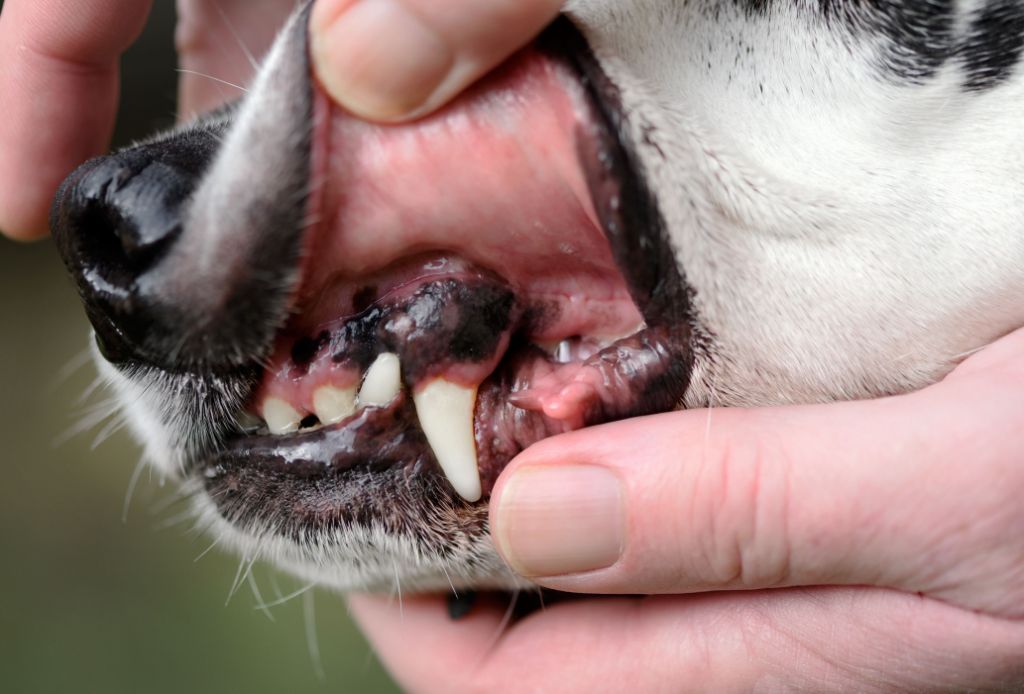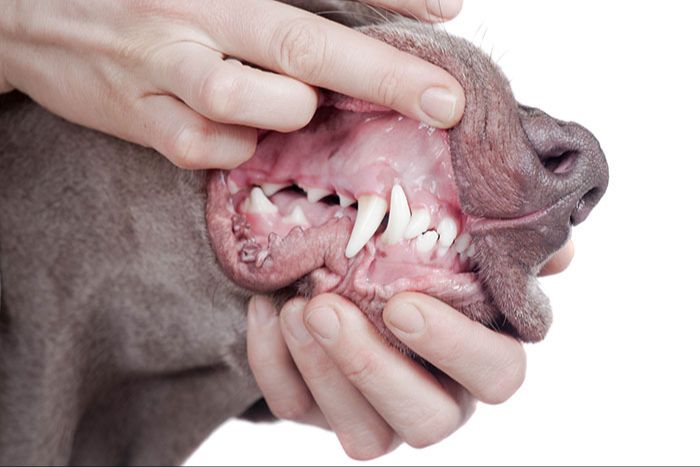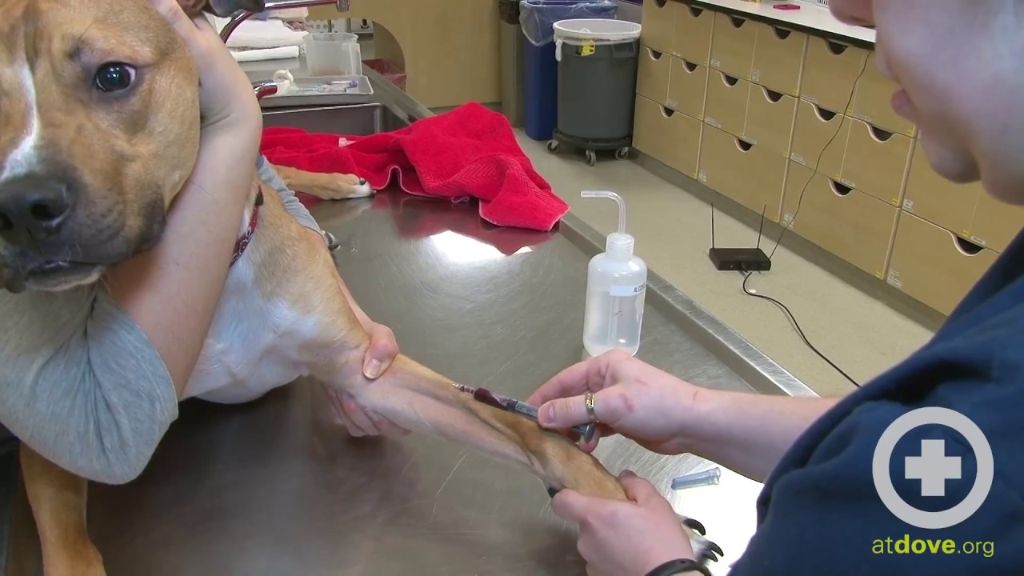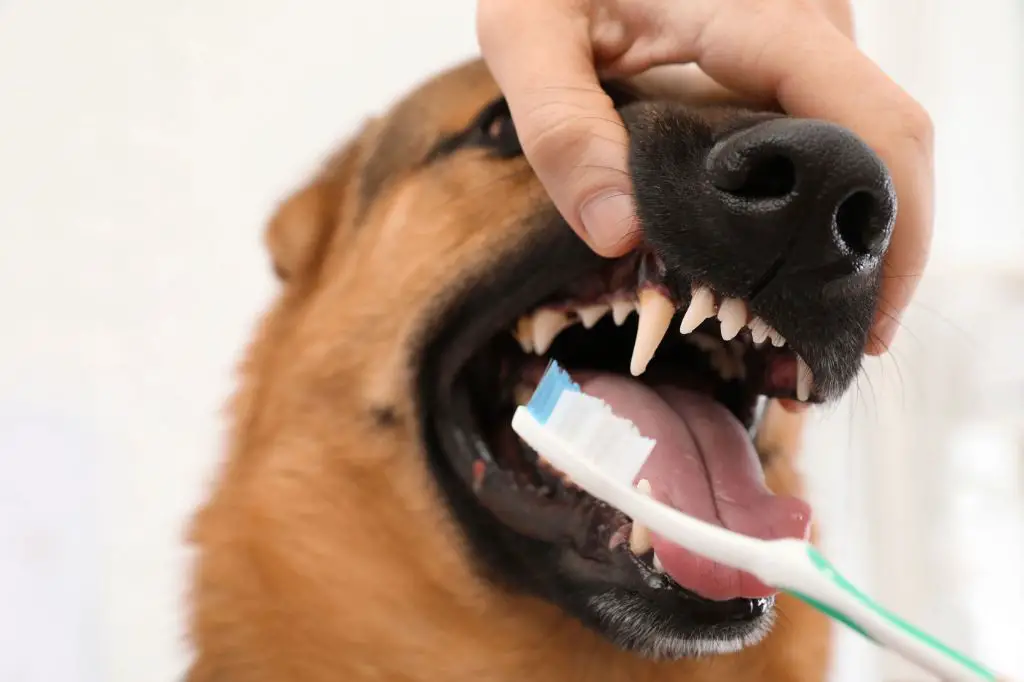What Causes Black Gums in Dogs?
There are a few potential causes for black gums in dogs:
Melanin pigmentation – Some breeds like Chow Chows and Shar-Peis are genetically predisposed to having black pigment in their gums due to higher levels of melanin. This normal pigmentation is not a cause for concern.

Dental issues – Periodontal disease and gingivitis can cause inflammation and receded gums, making the underlying black gum tissue more visible. This may indicate an oral health problem.
Oral melanoma – Though rare, melanoma of the mouth can cause gum discoloration and darkening. Oral melanoma tends to be very aggressive if not caught early.
Hyperpigmentation disorders – Some disorders like Addison’s disease and melanosis can cause excess melanin production, leading to generalized blackening of the gums and other tissue.
Is It Normal for a Dog to Have Black Gums?
For most dogs, pink is considered the normal gum color. Healthy gums should be bubblegum-pink and moist. This pink color comes from the blood circulation in the gums.
However, some dog breeds can have dark pigmentation in their gums that is perfectly normal. These breeds include Chow Chows, Shar-Peis, and some mixed breeds. The dark gum color comes from heavier pigmentation and is no cause for concern in otherwise healthy dogs of these breeds.

While dark gums can be normal in some cases, it’s still important to observe your dog for any other symptoms. Rapid gum color change, inflamed gums, oral pain, or other signs of illness require veterinary attention. So even if your dog is a breed with traditionally darker gums, keep an eye out for abnormalities and see your vet if you have any concerns.
When to See the Vet for Black Gums
If your dog’s gums suddenly turn black, it’s important to schedule a veterinary appointment right away. An abrupt color change in your dog’s gums often signals an underlying health issue that requires quick evaluation and treatment.
You should bring your dog to the vet as soon as possible if their gums look black and also appear painful, inflamed, or swollen. These signs indicate irritation or infection, which need veterinary attention to resolve.
It’s also crucial to get your dog seen if black gums are accompanied by other concerning symptoms. Weight loss, lethargy, vomiting, diarrhea, or loss of appetite along with black gums merit an urgent vet visit to diagnose the cause.
While ginger brown or jet black pigmentation on a dog’s gums can be normal in some breeds, a sudden color change, especially to blackish-purple gums, is not typical. Your vet can examine your dog’s mouth and distinguish natural pigmentation from an underlying medical issue.
Don’t wait to see if symptoms improve on their own. Getting an prompt veterinary assessment for black gums can help diagnose and treat the cause early, improving your dog’s outcome. Your vet can recommend the best treatment options and follow-up care.
Diagnosing the Cause of Black Gums
If your dog is showing signs of black gums, the first step your vet will take is performing a full physical exam, including a detailed dental exam. They will look for any visible abnormalities in your dog’s mouth, evaluate the color and texture of the gums, assess any pain or discomfort, and check for loose or damaged teeth that could be causing issues.

Your vet will also ask about your dog’s full medical history, including any previous dental issues or procedures, recent illnesses or injuries, any changes in behavior like lethargy or appetite loss, and any medications your dog is taking.
To uncover the underlying cause of black gums in dogs, your vet may recommend bloodwork. Blood tests can detect conditions like anemia, internal bleeding, liver or kidney disease, and cancers that could be affecting the gums.
If infection is suspected, your vet may take a gum biopsy to analyze the tissue and identify any bacteria, fungi, or other pathogens present. Biopsies can also diagnose gum cancer and other oral tumors.
Advanced imaging techniques like dental x-rays, CT scans, or MRI scans may be recommended if your vet suspects oral cancer or needs to evaluate the jawbone for abnormalities. These imaging tests provide a more detailed look at the mouth and can pinpoint issues not visible during a standard exam.
With a combination of a thorough physical evaluation, your dog’s medical history, bloodwork, biopsies, and imaging, your vet will be able to diagnose the underlying problem causing black gums.
Treatment Options for Black Dog Gums
The treatment for black gums in dogs depends on the underlying cause. If a dental infection is to blame, the dog may need a professional dental cleaning and tooth extraction along with a course of antibiotics. For more severe dental disease, multiple extractions may be necessary.
If cancer in the mouth is causing the black pigmentation, more aggressive treatment like surgery, chemotherapy drugs, or radiation treatments may be recommended. The specifics will depend on the type of cancer and how advanced it is.
In some cases, simply managing pain and keeping the dog comfortable with palliative care may be the most humane option. Your veterinarian will discuss all of the possible treatment options and offer their recommendation based on your dog’s unique circumstances.
Home Care for Dogs with Black Gums

If your dog has been diagnosed with black gums, there are some at-home care tips that can help improve their oral health. Here are some recommendations:
Brush teeth regularly – Daily tooth brushing is ideal if your dog will tolerate it. Use a soft-bristled toothbrush and dog-safe toothpaste. Brushing helps remove plaque and tartar that can irritate the gums.
Provide chew toys – Giving your dog dental chew toys can help massage their gums and remove some plaque as they chew. Look for toys designed to clean teeth and gums.
Feed dental diet – There are specialty dog foods formulated to improve oral health. The kibble texture mechanically cleans teeth, and some foods contain ingredients to reduce plaque.
Administer prescribed medications – If medications are prescribed by your vet, be sure to give them as directed. This may include antibiotic or anti-inflammatory pills to treat infection or inflammation of the gums.
Preventing Black Gums in Dogs
There are several steps dog owners can take to help prevent their dogs from developing black gums and the dental disease that causes it:
Regular Dental Cleanings
Having your dog’s teeth professionally cleaned on a regular basis (usually once a year) can help dramatically reduce plaque and tartar buildup. Removing this debris helps prevent gum inflammation and infection.
Brush Teeth Daily
Brushing your dog’s teeth at home every day is one of the most effective ways to reduce plaque, keeping their gums healthy. Use a soft-bristled toothbrush and dog-safe toothpaste.
Dental Chews and Toys
Giving your dog specially formulated dental chews and toys helps scrape away soft plaque and tartar while they chew, helping clean their teeth and massage their gums.
High Quality Diet
Feeding a high quality dog food that promotes good oral health can make a difference. Look for kibble that is larger and harder for more chewing and mechanical cleaning of teeth.
Prognosis for Black Dog Gums
The prognosis for black gums in dogs can vary substantially depending on the underlying cause. Here’s an overview of the typical outlook:
Excellent if the black pigmentation is just harmless melanin pigmentation. This is not a medical condition and requires no treatment, so the prognosis is excellent.
Guarded if the black gums are caused by serious illnesses like oral cancer or melanoma. These conditions require intensive treatment and can carry a grave prognosis if not caught early.
Good if the black gums are due to periodontal disease and the condition is treated early. With proper dental cleaning and antibiotic treatment, gum color should return to normal pink in 1-2 weeks. However, periodontal disease can worsen over time if not properly managed.
The key is identifying the underlying cause through veterinary exams and diagnostic testing. Catching the issue early, whether it’s simply harmless pigmentation or something more serious, allows for the best outcome.
When to Seek a Second Opinion
If your vet is unable to provide a clear diagnosis for your dog’s black gums after conducting exams and tests, it’s a good idea to seek a second opinion. Sometimes another experienced vet may be able to shed more light on potential causes. Additionally, if your dog’s condition seems to rapidly worsen or fails to improve after the initial prescribed treatment, seeing another vet for their perspective could be very helpful.
Some dogs with black gums do not respond well to certain medications or therapies. Getting a fresh set of eyes on your pup’s case may reveal alternative treatment options that could be more effective for their specific situation. Another vet may suggest treatments or remedies that haven’t been tried yet but could still help turn things around.
At the end of the day, you know your dog best. If your gut is telling you to get a second opinion because things aren’t adding up or progress seems too slow, trust yourself. Your dog’s health and quality of life should always come first. Don’t be afraid to advocate and push for more answers if the initial diagnosis and treatment plan aren’t yielding the results you were hoping for.
Coping with a Dog’s Black Gum Diagnosis
Receiving a diagnosis of black gums in your dog can be worrying, but there are ways to cope. Here are some tips:
First, learn as much as you can about the condition and treatment options. Talk to your vet and ask questions so you fully understand what’s happening with your dog’s health. Do your own research as well so you can advocate for your pet.
Joining support groups can also help, whether online or in-person. Connecting with other owners of dogs with black gums allows you to share stories, advice, and encouragement. You can gain perspective from those who have been through it.
Most of all, focus your energy on providing the absolute best care possible for your dog. Follow your vet’s treatment plan, give any prescribed medications as directed, and monitor your dog closely at home. Show them extra love and patience as you both cope with this diagnosis.
While black gums can be serious, dogs are resilient. With medical treatment and dedicated owners by their side, many dogs go on to live happy lives despite this condition. Stay positive and know you’re doing everything you can to help your dog through this difficult time.
